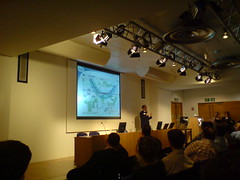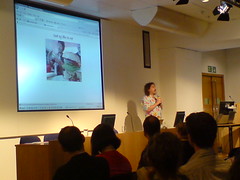Mobile Monday: Location, Location, Location
Mobile Monday: Location, Location, Location
Dan Applequist does an able intro, and demos Zonetag: "Yahoo! are innovating around the blockages that operators have put in place around location". They're keeping a big database of cell IDs, and ask the user if they can't match a cell ID to a location.
Andrew Grill, Seeker WirelessSubtitled "I still haven't found what I'm looking for". Been in telecomms for 20 years.
Seeker Wireless have 3 ex-Cambridge Positioning Systems PhDs with lots of patents. (What have CPS actually done? I've heard of them loads but not seen many products from them - are they perhaps an IP-generating company than don't sell direct themselves?). They have 2 customers.
History: in the 90s carriers had to provide location of handsets in the US. GPS is nearly 30 years old, is improved by assisted GPS. Location is hard: GPS satellites are 20,000km above the earth. Handsets aren't kept anywhere consistent. There's no one perfect solution. GPS is a challenge indoors: it's not great for everywhere. Someone has to pay for a location poll (I thought that avoiding this was one of the principal advantages of GPS, actually). Privacy issues exist with location. Postcodes aren't universally known - you can't just ask for them in all circumstances.
LBS is not TomTom! There are ways of doing it beyond that.
With Cell ID accuracy and cost is an issue. Andrew shows off an example of his "father tracking" application... which wouldn't have the required accuracy for, say, a security app.
The user experience of GPS is poor - if I can make a phone call, why can't I use GPS? (I'd argue that we already have folks used to poor signal reception on mobile through the "available bars" - why not extend this to GPS?).
Andrew shows off the N95 manual for GPS and its appalling usability: open the keypad, hold it at 45 degrees, etc. etc.
Seeker have high accuracy, not as good as GPS, but 50x as accurate as Cell ID. Not being a statistician, I'm not sure how you measure relative accuracies...
A few applications for this: mobile advertising, location based search (e.g. via Google or Yahoo!). The use Java and SIM toolkit + some smart maths between client and server "so it's the handset that's making the decision". By moving intelligence into the client, they avoid round-trip lookups over the network and reduce the cost of doing a polling-based service. They do location-triggered advertising, he demos The Canonical Starbucks Service and I feel slightly ill. I still don't get what this gains Starbucks over putting up a poster.
Seeker have been approached to do failover-from-GPS. Search companies will start demanding location data from operators, but operators don't have the capacity to offer this.
Q: Does this differ from CPS?
A: The original system was based on timing, we're based on signal strength. We don't need handsets to be modified, antennas, or any new equipment on towers. Still needs a small network integration.
Q: Do you not have a scalability issue with loading locations onto a handset?
A: We have IP to allow multiple profiles to be loaded onto and unloaded from the SIM.
Disclosure: Richard is a client of ours.
2.5 months of every year a child is in front of a screen of one form or another.
20% of the NHS budget is going to be spent on battling obesity.
Richard came across a small Bluetooth unit which connects to a mobile phone handset. People like their phones.
Demonstrates screenshots from Fruit Farmer. We're providing an API to allow third parties to create games. Game designers design a game, upload it to the LocoMatrix system, and folks go away and play it.
Demos follow
One that didn't really grab me, apart from the phrase "geofencing shaped zones".
Justin Davies, Buddyping
Wanted to take social networks mobile. Was annoyed when he was out drinking and didn't realise his friends were nearby too. On top of this they've built groups, social media, local photos. Just signed a deal with the guys who do mapping and info with Nokia. They use cell ID and GPS. Buddyping isn't completely accurate - his sales director, in the same room, is listed as being 0.3 miles away. Includes messaging. Very complete control over privacy and location data.
You need to be able to set context too (so says Helen Keegan). Local photo streams. We're not trying to be revolutionary, we're trying to take thousand-year old ideas about socialising and mobilising them.
SportsDo
Been going for about 3 years. About buddy tracking for fun, family tracking for safety, corporate tracking for accountability. They understand how to process and visualise trillions of GPS locations in a commercially useful way.
Have a range of products: mobile, GPS, desktop. Rental partners. Integration with Garmin products to do desktop stuff. Lots of very nice skiing videos too :)
More at www.sportsdo.mobi.

